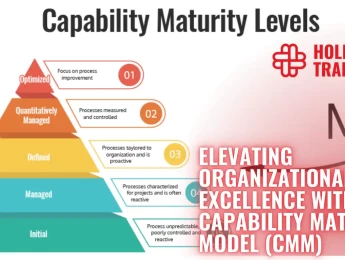Introduction
In 2024, management skills have ascended to unparalleled importance, reflecting the intricate nexus of business evolution, technological strides, and shifting workforce dynamics. Managers are tasked with seamlessly integrating cutting-edge technologies like AI and automation to bolster productivity and competitiveness, while adeptly navigating the complexities of hybrid work models, prioritizing employee well-being, and fostering inclusive workplaces. With a relentless pace of change, managers must exhibit agility and resilience, driving strategic initiatives amidst uncertainties and market shifts. Moreover, they are pivotal in championing customer-centric approaches, embedding sustainability into operations, and nurturing talent development. In this landscape, data-driven decision-making, global acumen, and adept leadership are indispensable, underscoring the pivotal role of managers as orchestrators of organizational success in the dynamic milieu of 2024.
What is the Importance of Management Skills in 2024?
In 2024, management skills are more crucial than ever for several reasons, reflecting the evolving landscape of business, technology, and the workforce. Here are the key points highlighting their importance:
1. Navigating Technological Advancements
The rapid pace of technological innovation, including artificial intelligence, machine learning, and automation, requires managers to be adept at integrating new technologies into their operations. Effective management ensures that technological tools are leveraged to enhance productivity and competitiveness.
2. Adapting to Hybrid Work Models
The COVID-19 pandemic accelerated the adoption of remote and hybrid work models. Managers need to develop skills to lead dispersed teams, ensuring effective communication, collaboration, and maintaining company culture despite physical distances.
3. Emphasizing Employee Well-being and Mental Health
There is a growing recognition of the importance of employee well-being and mental health. Managers play a crucial role in creating supportive work environments, identifying and addressing stressors, and promoting a healthy work-life balance to maintain a motivated and productive workforce.
4. Driving Diversity, Equity, and Inclusion (DEI)
Modern organizations prioritize DEI initiatives. Managers must be equipped to foster inclusive workplaces, address unconscious biases, and implement policies that support diversity. This not only enhances company culture but also drives innovation and performance.
5. Agility and Change Management
The business environment in 2024 is marked by rapid changes and uncertainties. Managers must possess agility and change management skills to quickly adapt to market shifts, regulatory changes, and evolving customer demands. This involves strategic planning, risk management, and resilience building.
6. Enhancing Customer-Centric Approaches
With increasing competition and customer expectations, managers need to focus on delivering exceptional customer experiences. This involves understanding customer needs, leveraging data analytics for insights, and ensuring that the entire organization aligns with customer-centric goals.
7. Sustainability and Corporate Responsibility
Sustainability has become a core component of business strategy. Managers must integrate sustainable practices into operations, reduce environmental footprints, and demonstrate corporate responsibility. This is critical for maintaining brand reputation and meeting regulatory requirements.
8. Leadership and Talent Development
In a competitive talent market, managers must be skilled in attracting, retaining, and developing talent. This includes providing opportunities for continuous learning, career development, and fostering a culture of innovation and empowerment.
9. Data-Driven Decision Making
The ability to analyze and interpret data is essential. Managers need to make informed decisions based on data insights, which requires proficiency in data analytics and an understanding of key performance indicators relevant to their business goals.
10. Globalization and Cross-Cultural Management
As businesses expand globally, managers must navigate different cultural, legal, and economic environments. This requires cultural intelligence, understanding of international markets, and the ability to manage diverse teams across geographies.
Table1 : The vital importance of robust management skills in driving organizational success
Importance of Management Skills in 2024 |
|
Key Points | Description |
1. Navigating Technological Advancements | The rapid pace of technological innovation, including AI and automation, necessitates adept integration for enhanced productivity and competitiveness. |
2. Adapting to Hybrid Work Models | With the rise of remote and hybrid work setups, managers must develop skills to effectively lead dispersed teams while maintaining company culture. |
3. Emphasizing Employee Well-being and Mental Health | Creating supportive work environments and promoting work-life balance are essential for maintaining a motivated and productive workforce. |
4. Driving Diversity, Equity, and Inclusion (DEI) | Prioritizing DEI initiatives is crucial for fostering inclusive workplaces, addressing biases, and driving innovation and performance. |
5. Agility and Change Management | Rapid changes and uncertainties in the business environment necessitate agility and change management skills for adapting to market shifts and customer demands. |
6. Enhancing Customer-Centric Approaches | Meeting rising customer expectations requires a focus on understanding needs, leveraging data insights, and ensuring organizational alignment with customer goals. |
7. Sustainability and Corporate Responsibility | Integrating sustainable practices into operations and demonstrating corporate responsibility are vital for brand reputation and regulatory compliance. |
8. Leadership and Talent Development | Attracting, retaining, and developing talent are critical for success in a competitive talent market, necessitating a culture of continuous learning and empowerment. |
9. Data-Driven Decision Making | Proficiency in data analytics and informed decision-making based on data insights are essential for achieving business goals effectively. |
10. Globalization and Cross-Cultural Management | Navigating diverse cultural and economic environments while managing global teams requires cultural intelligence and an understanding of international markets. |
In 2024, the role of managers extends beyond traditional supervision to encompass strategic leadership, technological integration, and fostering a dynamic, inclusive, and resilient workforce. The ability to adapt and thrive in this complex environment underscores the vital importance of robust management skills in driving organizational success.
How is the Landscape of Management Evolving in 2024?
The landscape of management in 2024 is undergoing significant transformation driven by technological advancements, evolving workforce dynamics, and changing business priorities. Here are key trends shaping this evolution:
1. Integration of Advanced Technologies
- Artificial Intelligence and Automation: Managers are increasingly leveraging AI and automation to streamline operations, enhance decision-making, and improve efficiency. This shift requires managers to understand and implement these technologies effectively.
- Data Analytics: The use of big data and analytics is becoming more prevalent. Managers must be adept at interpreting data to make informed strategic decisions and anticipate market trends.
2. Emphasis on Soft Skills
- Emotional Intelligence: As the workplace becomes more interconnected, emotional intelligence is critical. Managers need to navigate complex interpersonal dynamics, build strong relationships, and foster a positive team environment.
- Communication and Collaboration: With remote and hybrid work models, effective communication and collaboration are paramount. Managers must utilize digital tools to maintain clear and consistent communication across dispersed teams.
3. Focus on Employee Well-being and Engagement
- Mental Health Awareness: There is a growing emphasis on mental health in the workplace. Managers are responsible for creating supportive environments that prioritize employee well-being and mental health resources.
- Work-Life Balance: Encouraging a healthy work-life balance is crucial to prevent burnout and maintain productivity. Flexible work arrangements and supportive policies are becoming standard.
4. Diversity, Equity, and Inclusion (DEI)
- Inclusive Leadership: Managers are increasingly tasked with fostering diverse and inclusive workplaces. This involves implementing DEI strategies, addressing biases, and ensuring equitable opportunities for all employees.
- Cultural Competence: As global teams become more common, managers must develop cultural competence to effectively manage and integrate diverse perspectives.
5. Agility and Resilience
- Adaptive Leadership: The ability to adapt quickly to changes and disruptions is essential. Managers must be agile, embracing change and leading their teams through uncertainty with resilience.
- Crisis Management: Effective crisis management skills are crucial as organizations face various challenges, from economic fluctuations to geopolitical issues.
6. Customer-Centric Strategies
- Enhanced Customer Experience: Managers are focusing on delivering superior customer experiences by understanding customer needs, leveraging feedback, and continuously improving service quality.
- Personalization: Utilizing data to provide personalized experiences is becoming a key competitive advantage.
7. Sustainability and Corporate Responsibility
- Sustainable Practices: There is a growing demand for sustainable business practices. Managers are integrating environmental, social, and governance (ESG) criteria into their strategies to meet regulatory requirements and consumer expectations.
- Corporate Social Responsibility (CSR): Emphasizing CSR initiatives helps build brand reputation and aligns with the values of a socially conscious consumer base.
8. Leadership Development and Continuous Learning
- Talent Development: Investing in leadership development and continuous learning opportunities for employees is critical. Managers need to mentor and develop future leaders within the organization.
- Lifelong Learning: Encouraging a culture of lifelong learning helps keep skills current and fosters innovation.
9. Digital Transformation
- Digital Leadership: Managers must lead digital transformation initiatives, ensuring that their organizations stay competitive in a rapidly evolving digital landscape.
- Tech-Savvy Management: Being proficient with digital tools and platforms is necessary for managing teams and projects effectively.
10. Ethical and Transparent Practices
- Ethical Leadership: Maintaining high ethical standards and transparency is increasingly important. Managers must ensure that their actions and decisions uphold the company’s values and build trust with stakeholders.
- Accountability: Being accountable and fostering a culture of accountability within the team ensures integrity and reliability in operations.
The management landscape in 2024 is characterized by a blend of technological savvy, emotional intelligence, inclusivity, and adaptability. Managers are expected to be forward-thinking leaders who can navigate complex environments, foster innovation, and prioritize both employee and customer satisfaction. This evolution reflects broader societal shifts towards more flexible, inclusive, and sustainable business practices.
What are the Benefits of Management Training Courses?
Management training courses offer numerous benefits to individuals and organizations, enhancing leadership capabilities, improving operational efficiency, and fostering a positive workplace culture. Here are the key benefits:
1. Enhanced Leadership Skills
- Improved Decision-Making: Training provides managers with tools and frameworks for making informed and strategic decisions.
- Conflict Resolution: Managers learn effective techniques for resolving conflicts and maintaining harmony within teams.
- Increased Confidence: Managers gain confidence in their ability to lead, inspire, and manage teams effectively.
2. Boosted Employee Performance and Productivity
- Effective Delegation: Training helps managers learn how to delegate tasks appropriately, ensuring that work is distributed according to team members' strengths and capabilities.
- Motivation and Engagement: Managers are trained in techniques to keep their teams motivated and engaged, leading to higher productivity and job satisfaction.
3. Improved Communication Skills
- Clarity and Consistency: Training emphasizes the importance of clear and consistent communication, which is crucial for team alignment and understanding.
- Active Listening: Managers learn to listen actively to their team members, fostering a culture of openness and mutual respect.
4. Enhanced Problem-Solving Abilities
- Critical Thinking: Management courses cultivate critical thinking and analytical skills, enabling managers to solve complex problems effectively.
- Innovative Solutions: Managers are encouraged to think creatively and develop innovative solutions to challenges.
5. Better Time Management
- Prioritization: Training teaches managers how to prioritize tasks and manage their time efficiently, leading to increased productivity and reduced stress.
- Goal Setting: Managers learn to set realistic and achievable goals for themselves and their teams.
6. Stronger Team Building and Collaboration
- Team Dynamics: Managers gain insights into team dynamics and learn how to build cohesive, high-performing teams.
- Collaboration Tools: Training often includes the use of collaboration tools and techniques to enhance teamwork and cooperation.
7. Increased Adaptability and Resilience
- Change Management: Managers are equipped with skills to handle change and guide their teams through transitions smoothly.
- Resilience Building: Training helps managers build personal and team resilience, ensuring they can withstand and bounce back from setbacks.
8. Higher Employee Retention and Satisfaction
- Leadership Style: Managers learn to adopt leadership styles that resonate with their team members, leading to higher job satisfaction and retention.
- Employee Development: Training emphasizes the importance of employee development and career progression, which can boost morale and loyalty.
9. Better Financial Performance
- Cost Management: Managers learn techniques for effective budget management and cost control, contributing to the organization’s financial health.
- Revenue Growth: By improving team performance and operational efficiency, managers can drive revenue growth and profitability.
10. Enhanced Strategic Thinking
- Long-Term Planning: Training encourages managers to think strategically and plan for the long-term success of their teams and the organization.
- Market Awareness: Managers gain insights into market trends and competitive landscapes, enabling them to make strategic decisions.
11. Compliance and Risk Management
- Regulatory Knowledge: Managers are trained on compliance with industry regulations and standards, reducing the risk of legal issues.
- Risk Mitigation: Training includes risk management strategies, helping managers identify and mitigate potential risks.
12. Cultural Competence and Diversity Management
- Inclusive Leadership: Managers learn how to lead diverse teams and create an inclusive work environment.
- Cultural Sensitivity: Training helps managers understand and respect cultural differences, enhancing global collaboration.
Table 2: Benefits of Management Training Courses
Benefits of Management Training Courses |
|
Key Benefits | Description |
1. Enhanced Leadership Skills | Training equips managers with tools for informed decision-making, conflict resolution, and increased confidence in leading teams effectively. |
2. Boosted Employee Performance and Productivity | Managers learn effective delegation, motivation techniques, leading to higher productivity and job satisfaction among team members. |
3. Improved Communication Skills | Emphasizing clear communication and active listening fosters openness and mutual respect within teams, enhancing alignment and understanding. |
4. Enhanced Problem-Solving Abilities | Management courses cultivate critical thinking and encourage innovative solutions to complex challenges. |
5. Better Time Management | Managers learn prioritization techniques and goal setting, leading to increased productivity and reduced stress in managing tasks efficiently. |
6. Stronger Team Building and Collaboration | Insights into team dynamics and collaboration tools enhance teamwork and cooperation, leading to cohesive, high-performing teams. |
7. Increased Adaptability and Resilience | Equipped with change management skills and resilience-building techniques, managers guide teams through transitions and setbacks effectively. |
8. Higher Employee Retention and Satisfaction | Adopting leadership styles that resonate with team members and prioritizing employee development boosts morale, loyalty, and job satisfaction. |
9. Better Financial Performance | Effective cost management and revenue growth strategies contribute to the organization's financial health and profitability. |
10. Enhanced Strategic Thinking | Encouraging long-term planning and market awareness enables managers to make strategic decisions aligned with organizational goals. |
11. Compliance and Risk Management | Training on regulatory compliance and risk mitigation strategies reduces the risk of legal issues and ensures operational integrity. |
12. Cultural Competence and Diversity Management | Inclusive leadership and cultural sensitivity foster an inclusive work environment and enhance global collaboration within diverse teams. |
Management training courses provide a comprehensive toolkit for managers to improve their leadership skills, enhance team performance, and contribute to the overall success of the organization. By investing in management training, organizations can cultivate a culture of continuous improvement, innovation, and high performance.
How Do You Choose the Right Management Training Course?
Choosing the right management training course involves assessing your personal and professional needs, understanding the course offerings, and ensuring the course aligns with your career goals. Here are steps and considerations to help you make an informed decision:
1. Identify Your Goals and Needs
- Career Stage: Determine whether you are a new manager, mid-level professional, or senior executive. Different courses cater to varying levels of experience.
- Skill Gaps: Identify specific skills you need to develop, such as leadership, communication, strategic thinking, or technical skills like data analytics or project management.
2. Course Content and Structure
- Relevance: Ensure the course covers topics relevant to your current role and future aspirations. Look for a detailed syllabus and module breakdown.
- Format: Decide if you prefer online, in-person, or hybrid learning. Online courses offer flexibility, while in-person training may provide better networking opportunities.
- Duration and Commitment: Consider the time commitment required and ensure it fits into your schedule. Some courses are short-term (a few weeks), while others might span several months.
3. Accreditation and Certification
- Credentials: Check if the course offers a recognized certification or is accredited by a reputable institution. This can add value to your resume and professional credibility.
- Provider Reputation: Research the training provider or institution offering the course. Renowned universities and professional bodies typically offer high-quality programs.
4. Cost and Value
- Budget: Evaluate the course fees and ensure it aligns with your budget. Consider if the cost is justified by the potential career benefits.
- Return on Investment: Think about the long-term value the course will bring to your career in terms of skills, salary increase, and job opportunities.
5. Learning Style and Environment
- Interactive Components: Look for courses that include interactive elements like live sessions, group projects, and hands-on activities, which can enhance learning.
- Support and Resources: Check if the course provides access to additional resources such as mentoring, discussion forums, and post-course support.
6. Reviews and Testimonials
- Feedback: Read reviews and testimonials from past participants to gauge the course's effectiveness and participant satisfaction.
- Success Stories: Look for case studies or success stories that demonstrate how the course has helped others in similar positions.
7. Future Opportunities
- Networking: Courses from prestigious institutions or those with a strong alumni network can provide valuable networking opportunities.
- Further Education: Consider if the course can be a stepping stone to more advanced training or qualifications in the future.
Conclusion
In conclusion, the landscape of management in 2024 demands a multifaceted approach, where managers serve as the linchpins of organizational adaptation and success. As businesses navigate through technological disruptions, changing workforce dynamics, and evolving consumer expectations, the role of managers becomes increasingly pivotal. By embodying leadership prowess, technological acumen, and a profound understanding of human dynamics, managers can steer their organizations towards resilience, innovation, and sustainable growth. In this era of flux, investing in the development of robust management skills is not just a strategic imperative but a cornerstone for thriving in the ever-evolving business landscape of 2024 and beyond.


























